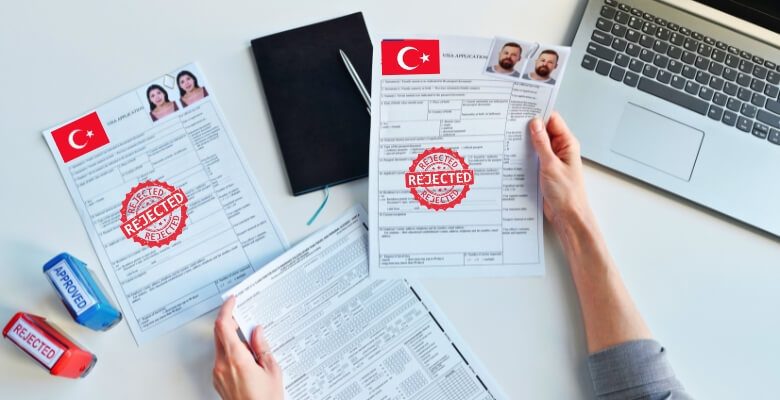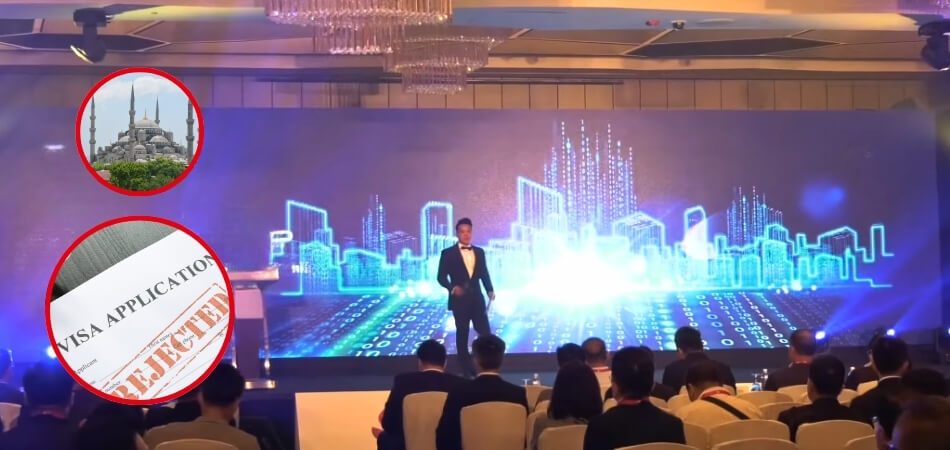Turkey offers a wealth of opportunities for professionals to network, collaborate, and grow through various conferences. To attend these enriching gatherings, a conference visa is essential. But what happens if I forgot to mention previous conference visa refusal Turkey?
If you fail to disclose your past visa refusal, your current visa application may be denied or you may be suspected of providing inaccurate or incomplete information. This could affect your credibility with immigration authorities.
Being aware of the importance of transparency and thoroughness in your visa application is essential to avoid such issues. Continue reading the article to learn more about these potential consequences and how to handle them.
Turkey Conference Visa – What Makes It Worthwhile?
Getting a conference visa for Turkey is a smart decision for professionals seeking global networking opportunities. Turkey is a country where multiple cultures blend, offering attendees a unique experience. Conferences held here attract professionals from many sectors, encouraging collaboration and the sharing of ideas. The visa process is simple, making it convenient for attendees to focus on their goals.
Turkey is home to many international conferences across different industries, including science, technology, and business. These conferences allow participants to expand their knowledge and build professional relationships. Attendees can also explore the rich history and culture of Turkey during their stay. The visa allows you to attend conferences without hassle, ensuring a productive trip.
In addition to ease of entry, attending a conference in Turkey in 2024 with invitation letter has many advantages. By using an invitation letter, you can save time on visa approval. This letter not only supports the visa application but also confirms your role in the conference.
Importance of Disclosing Previous Visa Refusals
Disclosing previous visa refusals is crucial when applying for a new visa. It provides a complete and transparent record for immigration officials. This honesty helps establish your credibility, which is fundamental in visa applications.
Having a complete record of your travel history is essential when you plan to attend a global conference in Turkey. If immigration authorities discover unrecognized visa issues, it can cast doubt on your intentions. This might limit your chance to engage with international peers and experts.
Being aware of the consequences of nondisclosure can motivate applicants to be detailed in their applications. A denied visa based on nondisclosure can delay or cancel your travel plans entirely. Always ensure all required information is accurately presented to avoid such setbacks.
What Led to The Previous Conference Visa Refusal in Turkey?
A visa application’s complexities can be intimidating, especially when the application is refused. Knowing the reasons behind these rejections is essential for future applications. Here, we explore what might lead to a conference visa refusal in Turkey:
Insufficient Documentation
Applicants often miss out on including all required documents in their submission. Essential paperwork like accommodation proof or return tickets may have been overlooked. The lack of proper documentation casts doubts on the applicant’s intentions and plans. It’s necessary to double-check the required documents.
Financial Inadequacy
Financial stability is essential for visa approval. Sometimes, applicants fail to provide evidence of sufficient funds to cover their stay. Immigration authorities need assurance that visitors can support themselves financially. Without this proof, visa denial risk increases significantly.
Past Immigration Violations
Previous breaches of visa conditions can lead to refusals. Applicants who have overstayed or violated terms in the past are flagged as a potential risk. Such history suggests to authorities that the applicant might not comply with visa regulations again. This significantly hampers approval chances.
Unclear Purpose of Visit
The clarity of the intent behind traveling is vital. Applicants who fail to articulate a clear purpose for attending the conference might face refusal. Irregular or incomplete explanations do not inspire confidence in immigration officials. They prefer applicants with a well-defined reason for their visit.
Impact of Family Ties on Visa Approval
Family ties can significantly influence the outcome of a visa application. Immigration officials often assess the applicant’s connections to their home country, as this indicates their intent to return. A lack of strong family ties can raise concerns about overstaying, which can result in the rejection of a Turkey visa due to family ties. Providing evidence of close family connections, such as marriage or dependents, can help strengthen an application.
Inconsistent Travel History
A patchy or problematic travel history can alert visa officers. Frequent travel to high-risk regions might raise concerns about applicant intentions. Such patterns can lead officers to question the applicant’s travel reasons. To obtain approval, it is crucial to maintain a consistent travel record.
Doubts About Return
Your intent to return home after your visit needs to be assured to the authorities. If the application lacks compelling ties to the home country, such as employment or family, suspicions may arise. Strong connections to your home country help prove your intent to return.
What Happens If I Forgot to Mention Previous Conference Visa Refusal Turkey?
The process of applying for a Turkey conference can be daunting, particularly if you have been refused a visa in the past. Failure to disclose such an event could have serious consequences. Here’s what could happen if you forget to mention the previous conference visa refusal:
Initial Processing Delays
Delays often arise during visa application processing. As immigration officials cross-reference past records, they may discover the oversight. This discovery can slow down your application processing. Timely processing is critical for attending planned events.
Impact on Current Application
Your current visa application may be at risk if past refusals come to light unexpectedly. Immigration authorities view non-disclosure as a lack of transparency. This perceived dishonesty can lead to immediate application denial. Always aim for accuracy and completeness in your visa applications.
Credibility with Immigration
Your credibility with immigration authorities could suffer a significant blow. Once trust is compromised, it may affect future visa applications. Authorities rely heavily on the honesty of the information provided. Restoring trust after such an incident can be challenging.
Possible Interview Requirement
You might be required to attend an interview to clarify the reasons behind your omission. Interviews can be daunting and require additional preparation. They are used by authorities to gauge the sincerity and reliability of your statements. Being prepared to discuss past refusals openly can be beneficial.
Increased Scrutiny in the Future
Future applications could face heightened review from visa officers. Every detail you provide will likely be examined more closely. Extensive scrutiny can extend the application process, requiring more detailed documentation. This vigilance is intended to ensure full immigration regulations compliance.
Risk of Permanent Record Notes
In your permanent immigration record, notes may be added to flag your file for future reference. Such notes can alert officers to watch for potential errors in your statements. A flagged record may lead to more rigorous checks in subsequent travel or visa applications. Maintain a clear record by disclosing all necessary information upfront.
Steps You Can Take to Disclose Previous Turkey Conference Visa Refusal
A successful reapplying process can be sped up significantly by addressing a previous visa refusal effectively. You can increase your chances of approval by disclosing this information correctly. Follow these structured steps to ensure your disclosure is clear and comprehensive:
Step 1: Review the Application Requirements
Review the visa application guidelines provided by the Turkish embassy or consulate thoroughly before beginning the application process. Be aware of the information that is needed, especially if you have had issues with visas in the past. By taking this initial step, you are able to ensure that all necessary documents and information are gathered to support your new application.
Step 2: Prepare a Detailed Statement
Explain the circumstances of your previous conference visa refusal in a detailed statement. Be honest and precise in your description, focusing on what happened and why. This statement should show that you are aware of the reasons for the refusal and take them seriously. Clarity and honesty in this document are key to rebuilding trust.
Step 3: Gather Supporting Documentation
Gather documents that support your statement and show your progress since your last application. This might include new financial statements, employment verification, or further details of your itinerary. Such documents are essential as they provide solid evidence of your claims and current situation.
Step 4: Consult a Visa Specialist
Consider consulting with a visa specialist or legal advisor who is familiar with Turkish immigration laws. They can provide valuable insights on how to effectively present your case. A specialist can also review your application and statement to ensure all information is complete and presented in the best light.
Step 5: Submit Your Application Early
Prepare your visa application and disclosure statement well in advance of your intended travel dates. Early submission allows extra time for processing and any additional scrutiny due to your past refusals. It also shows that you are serious about adhering to the proper channels and respecting the visa process.
What Can You Do After Getting a Turkey Conference Visa?
A Turkey conference visa allows you to attend various events while exploring professional opportunities. It opens doors for networking, collaboration, and cultural experiences. Here are some key things you can do with your Turkey conference visa:
- Attend International Conferences: Your visa allows you to participate in global conferences, which will expand your industry knowledge. It provides valuable learning experiences and networking opportunities.
- Explore Career Opportunities: While attending the conference, you can explore job prospects in Turkey. This can help expand your professional horizon.
- Network With Industry Leaders: Meeting professionals in your field is easier with a conference visa. You’ll have a chance to build lasting business relationships.
- Gain Access to Exclusive Workshops: Some conferences host exclusive workshops and training sessions. These workshops can offer specialized knowledge and skill development in your industry.
- Engage in Cultural Exchange: The visa provides an opportunity to engage with Turkey’s rich cultural heritage. This contributes to your overall conference experience.
- Collaborate on International Projects: With your visa, you can collaborate with global teams. This exposure can lead to new partnerships and international ventures.
- Participate in Local Business Events: Apart from the main conference, local business events are accessible. These events can provide additional insights into Turkey’s market.
- Enjoy Tourist Attractions During Free Time: Your visa allows you to explore Turkey’s beautiful tourist spots. From historic landmarks to scenic settings, there’s plenty to see.
- Build Academic Partnerships: For researchers and academics, the conference visa simplifies building partnerships with Turkish universities. This can lead to collaborative research opportunities.
- Convert Visa for Extended Stay: If your time in Turkey proves beneficial, you might consider converting your conference visa to permanent residency. As a result of this transition, the country will have new opportunities for personal and professional growth.
Frequently Asked Questions About What Happens if I Forgot to Mention Previous Conference Visa Refusal Turkey?
Getting through the visa application process can be complex, especially if you have a history of refusals. Failing to disclose a previous conference visa refusal can have serious implications for your current application. Here are some frequently asked questions to help clarify what happens if you forgot to mention a previous refusal in your Turkey visa application
What if I’m Unsure Whether a Past Visa Issue Needs to Be Disclosed?
When in doubt, it’s best to stay on the side of caution and disclose any past refusals or issues. Transparency is key to a successful application, and immigration authorities appreciate honesty. Providing complete information helps build trust and credibility with the officials evaluating your application.
Will Providing Evidence of Changed Circumstances Help My Current Application?
Yes, demonstrating improvements or changes since the previous refusal can strengthen your case and build credibility. Evidence such as new employment, financial stability, or positive changes in your personal situation can positively influence the decision.
What if I Genuinely Forgot About the Previous Refusal?
While unintentional, failure to disclose still carries consequences. It’s crucial to rectify the oversight as soon as possible to mitigate any negative impacts on your application. Contacting the appropriate immigration authorities to explain the situation can demonstrate your willingness to be transparent.
Will My Travel Plans Be Affected if My Visa Application Is Denied Due to The Omission?
Yes, a denied visa can disrupt your travel plans, particularly if you intend to attend a conference or event in Turkey. Timely disclosure and proactive steps are essential to minimize disruptions to your itinerary. Being upfront about your visa history can help ensure a smoother application process.
Can I Provide a Written Apology for the Omission in My Current Visa Application?
While a written apology can demonstrate remorse, it may not necessarily mitigate the impact of the omission. Focus on providing accurate and complete information in your application to avoid future complications. Transparency and a proactive approach are more beneficial than an apology alone.
Can I Explain the Omission During My Visa Interview?
Yes, you can provide an explanation during your visa interview, but it’s crucial to be honest and transparent about the oversight. Immigration officials appreciate applicants who take responsibility for their mistakes and seek to clarify any misunderstandings. Your willingness to address the issue can positively influence the outcome of your interview.
Bottom Line
The impact of failing to disclose a previous visa refusal reveals profound implications for your visa application. This omission can delay processing, complicate your application, and damage your long-term travel prospects. It’s very important to approach visa applications with absolute transparency and accuracy.
When considering “What happens if I forgot to mention the previous conference visa refusal Turkey?”, the consequences are clear. An oversight of this nature can undermine your credibility with immigration officials and lead to the denial of your application. This honest disclosure is critical for maintaining a smooth relationship with visa authorities.
A complete openness in visa applications not only ensures successful processing but also ensures you will be able to engage in international events on a professional level. By dealing with previous visa issues thoroughly, you will be able to travel and participate in conferences easily in the future.








